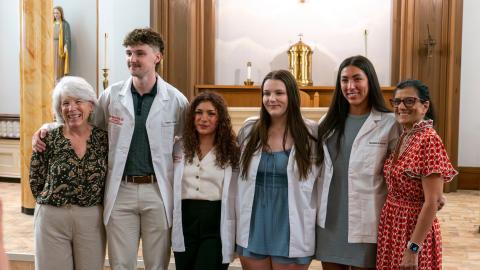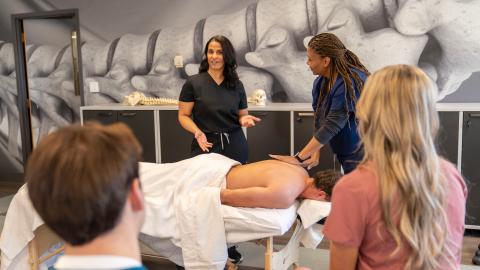
Modern Mannequins Help Teach D'Youville Nursing Students
“Real Life” Modern Mannequins Dramatically Help Teach D’Youville Nursing Students in New Labs
Campus Open House Wednesday April 25 from 2:30 to 6:00 PM – ALT 308
Buffalo, New York – April 11, 2012 – The D'Youville College School of Nursing is putting the final touches on a new state-of-the-art Simulation Laboratory that will be a key ingredient in the education of its nursing students. It will be ready for the fall 2012 semester, according to Dr. Judith Lewis, Dean of the School of Nursing.
A "Sim Lab" by definition is where simulation is used to imitate the operation of a real-world process, in this case nursing situations that a student will encounter as a nurse in a hospital or in practice.
The star of D'Youville's new lab is "Don d'Youville" an $85,000 full body high tech patient simulator mannequin that brings amazing realism to nursing students today. (Don can also become a female mannequin.)
The official name is 'SimMan3G', manufactured by Laerdal with offices in Wappinger's Falls, N.Y., and it is the most advanced patient simulator available today. It has a wide range of vital signs, clinical signs and symptoms that mimic a real human patient. "Don" can blink his eyes, has heart and bowel sounds, and simulates breathing with normal and abnormal breathing sounds, and can urinate or bleed, among its many features. Utilizing today's technology, it is wireless and includes many features not available in earlier mannequins.
Specific situations such as heart attacks, breathing emergencies requiring an artificial airway, rescue procedures and a broad range of traumas can be designed by nursing professors and programmed into the mannequin to teach students how to handle a specific situation.
Routine procedures such as basic assessment skills, catheter and bone needle insertions, IV access, and a variety of other medical measures can also be performed on the mannequin.
"Don" can also talk to students thanks to a remote audio device that allows the nursing professor located in another room observing to have "Don" tell the student nurses what his symptoms are and how he feels. The students then can plan their nursing interventions.
D'Youville's Simulation Suite has two labs, one with "Don" and the second with a new $27,000 baby mannequin, 'SimBaby', and christened "Danielle d'Youville" that will allow students to focus on infant care. 'SimBaby' is an advanced infant patient simulator with realistic anatomy and clinical functionality.
"We want to add a "birthing" simulator and a child simulator in the future Dr. Lewis said. "Future simulators will be culturally diverse and represent changes that occur with aging process."
Each lab is designed like a real hospital room and cameras are at strategic locations so the lab training can be televised to other classrooms and recorded.
Studies show that learning in a nursing simulation lab gives students increased self-confidence in clinical judgment skills, aptitude for critical thinking, and almost real life "hands-on" experience before they actually become nurses.
"Students see the value of the experience to their nursing skills and attitudes, along with being able to engage in the simulation scenarios as if they are caring for a real patient in a real-life situation," says Colleen Koszelak, clinical skills lab coordinator in D'Youville's School of Nursing.
"So many patient situations can be addressed during human patient simulation, such as patient safety, infection control, psychomotor skills, patient and peer communication, and quality improvement innovations. Simulation provides a different method of transferring knowledge from a book to patient care," she said.
D'Youville junior and senior nursing students will be required to take courses in the simulation laboratory to learn how to apply their skills in clinical situations.
"Clinical Simulation, designed to increase in complexity and depth of required knowledge, will be integrated throughout the curriculum. We will be able to provide patient situations for students that might not occur during their clinical experiences. In this way, we will enhance critical thinking and the use of evidence in planning nursing interventions," according to Dr. Lewis
"A necessary part of the simulation will be the debriefing that will allow guiding the students through self-reflection in assessing and evaluation their actions, the efficacy of the interventions, and the responses of the "patients and families," critical components of holistic nursing care."
Simulation in training dates back to World War II when pilots were trained to fly in combat in early simulators. Its use continues today in flight simulators, the space program, safety engineering, testing, and even video games. The National League of Nurses endorsed the use of patient simulations in 2003.
D'Youville developed the first four-year nursing program in Western New York the early 1940s and today has 869 students enrolled in various nursing programs.
- 30 –
Contacts: Dr. Judith Lewis, Dean of the School of Nursing, at 829-7856 or Colleen Koszelak, Clinical Skills Lab Coordinator, at 829-7852

